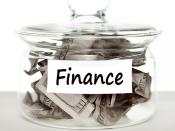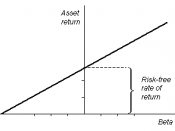The study of the role played by psychological factors in financial decision making and hence their effect on overall market outcomes. In particular, behavioral finance studies the ways in which individual and group behaviour deviates from the rational pursuit of self-interest posited by classical economic theory. A range of cognitive and emotional biases affecting decision making in conditions of uncertainty have been identified: these include systematic errors of judgment in estimating probability, the tendency to underreact to new information and then to 'compensate' by overreacting, and the unwillingness to realize a nominal loss (e.g. by selling shares that have fallen in value). Behavioral finance holds that such biases may create significant market anomalies, especially when they become self-reinforcing within a social group (e.g. in cases of panic selling).
Behavioral Finance consists of two hypotheses and one conclusion. Hypothesis 1 is that decision-making behavior under uncertainty, whether individual or institutional, involves the use of rules of thumb as opposed to rigorous algorithms, and therefore incorporates heuristic-driven bias.
Hypothesis 2 is that decision makers under uncertainty take cognizance of the form as well as the substance of the risky alternatives they face. That is, they consider the framing of their choices, whether such frames are economically relevant or not. The conclusion of Hypotheses 1 and 2 is that markets are inefficient where inefficiency is defined as the systematic (as opposed to random) departure of prices from fundamental values (Shefrin, 2002).
Behavioral biases, as presently articulated, are not user-friendly because there is not a widely accepted "industry standard" methodology of identifying an individual investor's biases. Researchers have done a significant amount of work to reveal behavioral biases, which are certainly usable, But practitioners would enormously benefit from a comprehensive volume, which does not presently exist. If an investor's behavioral biases have been identified,


